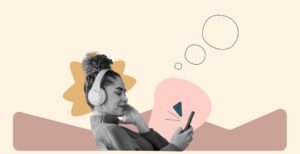Laura Key, VP, Content at Understood.org writes for PodcastingToday about the power of podcasts and the responsibility of being behind a microphone.
Women with ADHD trust podcasts more than they trust mainstream media. Hosts can’t afford to get it wrong.
The mic is powerful. Done responsibly, podcasts can be validating and life-changing. Done carelessly, they can be dangerous.
The rate of new ADHD diagnoses among women has nearly doubled in recent years. Yet stigma and gaps in care persist. An estimated 26 million women in the U.S. have a learning or thinking difference like ADHD or dyslexia. But 50 to 80 percent of them remain undiagnosed or misdiagnosed. The consequences of late or missed diagnoses can be profound: Workplace discrimination. Self-harm. Domestic violence. Many women feel forced to hide their true selves. This leads to chronic stress, burnout, and limited opportunities for self-advocacy.
I know this all too well.
When I was 30, I was diagnosed with ADHD. But I didn’t believe it. I told myself it would go away. Maybe I was afraid of the stigma. Maybe it was my perfectionism. Maybe I thought I should just power through my struggles. Deep down, I didn’t think I deserved a reason for why things felt so hard.
Then one day, I stumbled across an old journal from when I was 14. Every other page had the word “focus” scribbled over and over — in different shapes and sizes, the clumsy bubble letters of a teenager. Seeing my own handwriting and the desperation it held, I broke down crying. That moment changed how I saw and cared for myself. And it made me wonder how others were navigating similar realisations.
Thirteen years ago, following my diagnosis, one of my biggest challenges was finding resources that truly spoke to me — credible and expert-backed, yet human and relatable. Most of what I found didn’t reflect my experience. I couldn’t see myself in the words that were supposed to describe my own life.
On some level, that makes sense. Women with ADHD have historically been overlooked by traditional mental health care. They’re increasingly turning to alternative spaces for guidance, information, and connection. Podcasts have emerged as a particularly powerful medium.
With nearly 600 million podcast listeners worldwide and more than 7 million active shows, podcasting has become one of the most saturated media markets. With ad spending projected to reach $4.5 billion in 2025, there’s strong incentive for anyone to launch a podcast — sometimes with profit in mind rather than responsibility to the audience.
That’s what makes podcasts both powerful and precarious. They offer something that traditional channels often can’t: They’re easily accessible. And they create a personal, one-to-one connection between host and listener. For women who have felt overlooked or dismissed by traditional health systems, this connection matters. But intimacy without accuracy can be dangerous.
That’s why after years of receiving anecdotal feedback on our own podcasts from listeners — mostly women with ADHD — we dug deeper. We wanted to understand what women expect from podcasts, and how podcasts contribute to their health literacy. Partnering with Torrens University Australia, we surveyed over 400 women with ADHD who listen to ADHD Aha! and MissUnderstood. More than nine out of ten said they trust these podcasts and their hosts to share accurate health information. Among their media choices, they trust podcasts (72%) more than they trust mainstream media (56%) and social media (47%).
As a podcast host, I don’t take this lightly. It’s an important reminder that the very qualities that make podcasts powerful — relatable voices, personal storytelling, trust — can also make them vectors for misinformation.
Take The Joe Rogan Experience, which in 2022, saw over 1,000 doctors, scientists, and health professionals urging Spotify to address what they described as the COVID-19 misinformation spread on the show. Similarly, Steven Bartlett’s Diary of a CEO was also accused of airing health-related episodes with misleading advice.
This underscores the epic weight of the mic. Podcasts can either perpetuate misinformation at scale, or they can become spaces of validation, education, and trust. When done right, they’re transformative, blending real human stories with insights reviewed by credentialed experts (not armchair experts) and delivered in a relatable way. For women with ADHD, these podcasts aren’t just a source of knowledge. They’re a lifeline, offering understanding, belonging, and hope.
When I look back at that old journal, I see a kid desperate for answers. If resources like the ones we’re creating today had existed for me, I might have understood myself sooner — and been kinder to myself. That’s the power of a microphone. And that’s why we must wield it with care. Fact-check. Blend stories with verified expertise. Resist the pressure to prioritize clicks or advertising over truth.

Laura Key, a longtime editor, is the vice president of content strategy at Understood.org and host of the ADHD Aha! podcast. She has two kids who keep her busy when she’s not working — and sometimes when she is working.


